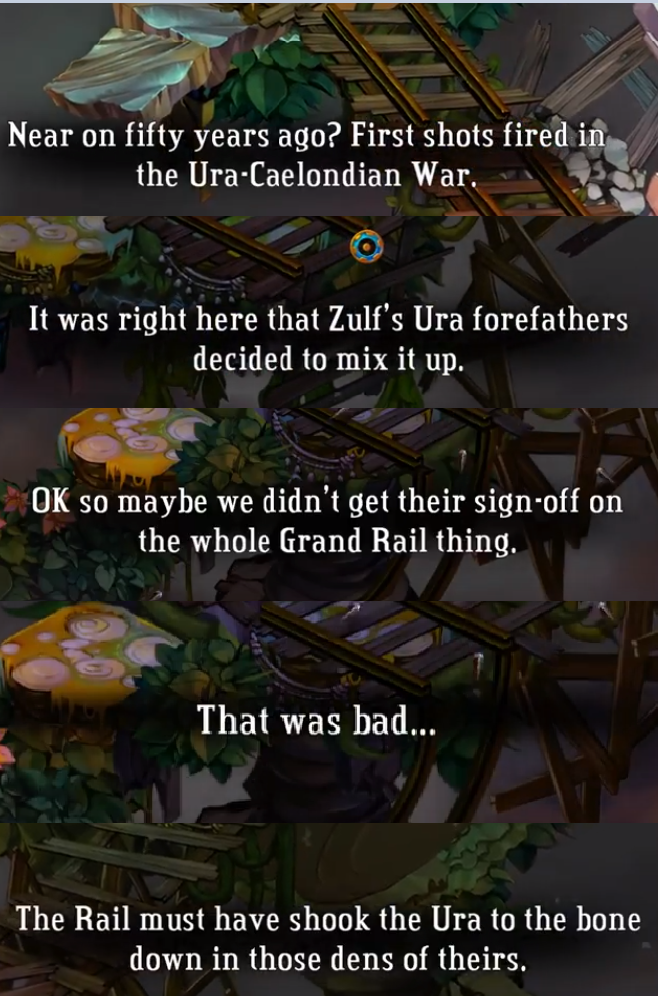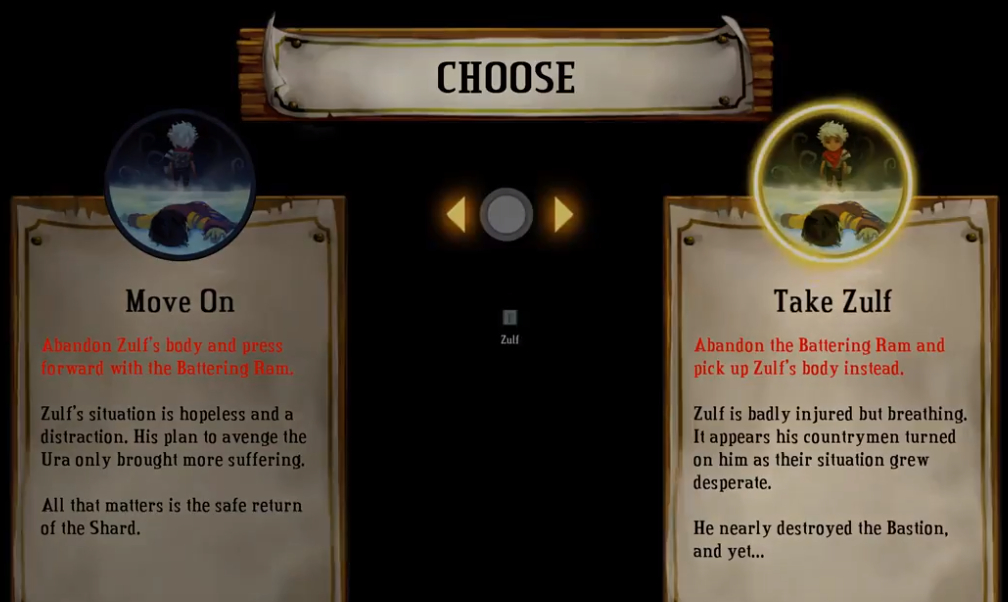I can't write this post without talking about spoilers, so this is your warning now. Bastion is gonna be on the Switch in like three days though, so you should definitely get it if you can!
Here's a quick summary of the game Bastion. If you already know the game, feel free to skip this section.
One day, a Kid wakes up to find himself floating on a rock in the sky. A Calamity had obliterated the world, and only floating scraps of land remain. He makes his way to the Bastion - where everyone agreed to go in case of trouble - and finds one other survivor, a fellow Caelondian named Rucks. Under his guidance the Kid sets out to collect power cores and restore power to the Bastion (which has the ability to "restore everything"). While on this journey, the Kid finds and befriends two survivors, Ura folk named Zulf and Zia. (The Caelondians and the Ura used to be at war, but that’s all in the past now.)
Eventually, everyone finds out that the Calamity was caused by Caelondians who wanted to engineer a means to murder all Ura. Zulf sabotages the Bastion and flees in response. The Kid tracks down Zulf to his Ura homeland where the remaining Ura people had beaten Zulf unconscious for leading the Kid (and his destructiveness) to their homeland.
The climax of the game is as follows: The Kid may utilize a battering ram to obliterate the remaining Ura people and escape, or the Kid may pick up Zulf and carry him home.
-- end summary --
Did you ever notice that if you choose to save Zulf, Bastion doesn't have a final boss fight? I kind of felt like it did because of how the game seemed to easily carry the expected cadence of rising action and crescendo end, but turns out the climax of the game is just you carrying a guy.
How in the world does the game manage to make a satisfying conclusion without a cumulative fight, a big test of the hero's skills, a final trial that makes the player's heart rush with anxiousness and energy? At least if you choose to abandon your friend in favour of your war machine, you can finish your imperialist assault against the nation your country tried to eradicate. At least that's more in line with standard RPGs; and while more of a brawl than a final boss, it still feels appropriately exciting. But somehow, walking around with a mopey boy produces an equally-or-more satisfying ending than a big old fight.
The lack of End Boss is particularly interesting in Bastion because the game does have a few bosses such as Queen Anne, proving that the game mechanics are capable of allowing traditional boss fights to take place. What this means is that avoiding the implementation of a final boss is, whether intentional or not, a subversion of regular tropes within the combat-heavy genre that Bastion's a part of.
It's maybe fun to speculate about what Supergiant intended with this end sequence, but I also don't particularly care about authorial intent - I only care about how this game makes players feel. And in this regard, I had such overwhelming emotional satisfaction that it took me seven years to realize there technically wasn't even a final battle to this game. Indeed, upon reflection, I've concluded that Bastion is better for its lack of end boss because I feel like questions of nonviolence and reclamation are kind of the underlying themes of the game.
I don't even know where to start with Ruck's rhetoric
It's hopefully a revelation to nobody that Bastion functions almost perfectly as an allegory of colonialism and xenophobia manifest into a tragic logical conclusion. It is this logical conclusion, the Calamity, where we first watch a Kid wake up on a rock in the sky. Even lovable Rucks is an obvious artifact of the old world: he can't escape his biases as he consistently wanders into backhanded descriptions of the Ura's various cultural differences from Caelondia.
And of course, there's the fact that the Caelondians built a weapon with the plan of murdering the entire Ura people if they "needed to".
What I'm trying to say here is that it makes sense for Bastion's final hour to be about decision-making and choosing to either 1) shoulder the burdens of the past, or 2) conduct a final act of warfare.
It's perfect in almost every way, from a symbolic to gameplay to visual standpoint. What better way could there have been for Bastion to compose a climactic cumulation and reflection of your actions? There's only two plot decision points in the game, and the decision to carry or abandon Zulf is (in my opinion) a self-reflection to determine if you understand the story or not.
So what happens if you carry Zulf? Well, here is where I think Supergiant Games made a very cool decision with how to handle the concept of a final "boss", if you don't want to wield the battering ram: they make you powerless.
It seems that instead of a big person to kill, you instead face the repercussions of your decision to give mercy to your "enemy". Not only must you walk quite slowly back to the Bastion with the weight of Zulf on your shoulders, but you also have to bear the attacks of dozens of Ura; perhaps all of the Ura that remain in the world.
The game's interface fades away as you walk, but it retains the flashing borders and popup "Heal!" to indicate that yes, you are still losing health from the Ura assault. You can't retaliate - they're keeping their distance, and your hands are full carrying Zulf. Eventually you run out of health potions and you're still flashing red, about to die... but slowly, one by one, the Ura stop shooting. They step aside and let you pass while you march home to the tune of Zulf's canticle.
“I set my sail
Fly, the wind it will take me
Back to my home, sweet home
Lie on my back
Clouds are making way for me
I’m coming home, sweet home
I see your star
You left it burning for me
Mother, I’m here”
What I’m saying is that I think it's thanks to game mechanics that "walking and carrying something heavy" works as well as it does for the mood, particularly when Supergiant doesn't have the affordance of showing close-ups or interesting camera angles / graphics to highlight the struggle like Samwise had when he carried Frodo.
“Come, Mr. Zulf!” he cried. “I can't carry your past for you, but I can carry you.”
There's two main things that really make The Kid's moment awesome.
The first thing is the obvious - this final sequence is just narratively really good. It's ridiculously steeped in symbolism from start to finish. It's a massive departure from typical games. But while that's cool, that doesn't quite explain why the game still (to me) felt perfectly satisfying gameplay-wise. So let's take a look at some interesting mechanical choices now.
- Carrying Zulf severely limits your movement, preventing you from dodging , shielding or fighting.
- The flashing red of low health is shorthand for demonstrating the pain that the Kid must be feeling from the shots - the shorthand of 'red flash = pain' is helpfully established since the beginning of the game. The UI showing loss of health, and the prompt to heal, are the only UI elements remaining in this sequence.
Instead of pushing you to test your mechanical skills to the fullest, Bastion lowers the effectiveness and breadth of the mechanics afforded to you. And that, I believe, is the key. The game does not require you to perform at a high level of mechanical skill, but by lowering your mechanical capabilities, it produces almost the equivalent effect of a difficult fight. In both scenarios, the player is faced with a difficult challenge. The struggle, the unknown outcome, the high stakes, yet feeling in control of your fate (maintained through the low-health flash & ability to use health potions)... this is how carrying a man is just as intense as fighting one.
Thus, I've concluded the following list of points.
Games don't need a final enemy to feel satisfying, even if the game’s genre would support a fight.
It seems that tension/stress (and subsequent satisfaction when completing) comes from the player's confidence in completing a task, rather than the specific difficulty of the task itself. This means that tension is a function of (competence÷required output) rather than just the raw amount of adversary you're facing. This much is obvious: this function is called "difficulty".
But from this direction, we can arrive to a new realization: games can create the requisite tension expected of a finale by reducing the player's power rather than necessarily placing a high-skill task ahead.
Even on a smaller scale, designers help a player empathize with the protagonist by changing the function between input and output. For example, if players lose the ability to jump or move quickly, it actually makes Zulf (or the ram) feel like a legitimate burden.
Furthermore, designers can use UI to emphasize feelings of pain or loss by baking the UI into plot points. For example, the fact that we see the screen flash red indicates the Kid's pain.
Narratively speaking, by stopping the player from fighting and only letting them heal, the player can enjoy a shift in mindset; to save Zulf is to choose non-aggression. Preventing you from attacking reinforces the shift in the Kid's attitude and helps the player understand that the Kid now plays the role of a martyr instead of a fighter.
Making a choice is one thing, but reinforcing your choice through game mechanics is how I think you make a cohesive game.
I don't have a fancy word to describe this kind of stuff. "Agency modification" or "output-altering" is the closest I can get. But I think the idea of intentionally altering a character's power/abilities for a specific narrative purpose is awesome.
Obviously designers seem to do this kind of thing already, but I feel like it's somewhat under-utilized or not as consciously pondered as it could be. I just want to see more of this because I think games could reallly elevate their storytelling by being more mindful of the interplay between mechanics and plot.
If you have any games that make a good use of altering your character's abilities to push home a plot point, feel free to comment below. I'd love to hear more :)
Gameplay screenshots from TheGamerBay.


![Tune in to find out if this blog post is about the character or the game. [1][2][3][4]](https://images.squarespace-cdn.com/content/v1/5a67750480bd5e2d33afa823/1536420057555-LRJUZFOZFH0ZW7HZO5YC/f0a603ae7e5410c792b06d6f2d8a97aa.png)



